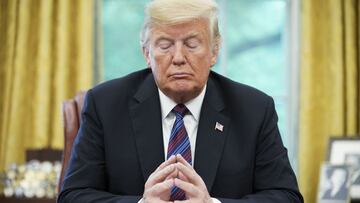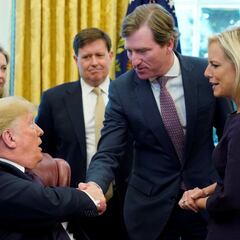What political actions can Trump undertake before Biden becomes president?
There are still 10 weeks until president-elect Joe Biden succeeds Trump in January. What powers does the “sitting duck” president have until then?

Joe Biden won the US presidential election on Sunday, 8 November 2020. He will officially take office, along with his running mate, Kamala Harris and brand new cabinet, on 20 January 2021 after his inauguration. The plans for his transition are well under way, but not without their issues – namely that the outgoing president refuses to publicly acknowledge defeat or co-operate in the transition process. Until then, however, for 10 more weeks, Donald Trump still has all the exact same powers and can still turn a few tables upside down in the Oval Office on his way out of the door.
What has Trump done since he lost the election?
Trump fired his Defence Secretary
The first working day after Trump’s loss was announced to the world, on Monday 9 November, he fired his Defence Secretary Mark Esper. Esper had publicly opposed Trump’s desire to deploy troops to the streets during civil rights protests across the US this summer. Trump swiftly replaced him with Christopher Miller, who notably lacks significant experience running an organisation of this magnitude, having enjoyed 11-month meteoric rise from counterterrorism advisor at the National Security Council. Those concerned that Trump has made the replacement to allow him free reign to carry out actions that Esper would not have been willing to approve, say that the action neglects the president’s duty to protect national security.
Just before the election, on 2 November, Trump passed a frightening executive order that made it even easier for him to hire and fire based on political motivations, in government worker roles, such as scientists. The new order creates a new category of civil servant into which the president can pour whomever he likes, those in the category are then stripped of normal job protections, guarding against biases like political affiliations and also allows a less rigorous hiring process. The usual recruitment process involves selecting from a competitive pool of applicants who are competent for the job.
Trump further cut off China
Later that week, on Thursday 12 November the freshly defeated Donald Trump issued an executive order barring investments in Chinese firms with military ties, arguing that such investments pose a risk to national security.
The move could really tie Joe Biden’s hands come January. “Unless Beijing reverses course and becomes a responsible player on the global stage, future US presidents will find it politically suicidal to reverse President Trump’s historic actions,” John Ullyot, a spokesman for the National Security Council, said in a statement.
The edge markets reported that this could be just the beginning of a series of hard-line anti-China actions in the coming weeks. Other actions under consideration include protecting US technology from exploitation by China’s military, countering illegal fishing and more sanctions against Communist Party officials or institutions causing harm in Hong Kong or Xinjiang, an official said. It may be that Trump cites human rights violations or threats to US national security to justify more sanctions.
Trump fired his cybersecurity director
Delve a little deeper into the messy aftermath of the election, and we come to the day that Trump fired national cybersecurity director Christopher Krebs. Krebs, whose full title had been head of the US Cybersecurity and Infrastructure Security Agency (CISA), was potentially the most important American official tasked with protecting the 2020 election from hacking and social media disinformation campaigns.
Nobody was surprised by this one, as Krebs’ agency had released a statement on 12 November refuting baseless claims - perpetuated by Trump himself - of widespread voter fraud. “The November 3rd election was the most secure in American history,” the statement read. “There is no evidence that any voting system deleted or lost votes, changed votes, or was in any way compromised.”
However the move being predictable makes it no less concerning, as Krebs' dismissal and the subsequent outpouring of praise for him only further exemplified Trump’s pattern of choosing loyalism over competency at an extremely fragile time for the country.
What more could Trump do before Biden takes charge?
An order was drafted on Monday this week to pull back American forces from various international conflicts. Withdrawing troops from long running conflicts against Islamic insurgents is something Trump has long desired not to foot the bill for, but critics argue that abruptly abandoning such conflicts can be extremely dangerous, leaving vacuums for terrorist groups such as Islamic State to rise up and strengthen across the middle east.
If the order goes ahead, it doesn’t mean that everyone is coming home right away. The current draft details that the number of troops in Afghanistan would be halved form it’s current total of 4,500 but in Iraq the Pentagon would only reduce the troops by slightly more than had previously been announced. In Somalia, almost all 700 troops deployed to training and counterterrorism there would come home.
In line with his penchant for firing people and his action terminating Mark Esper at the start of this month, insiders have predicted for several weeks now that Christopher Wray, the F.B.I. director and Gina Haspel, the C.I.A. director, could be next in line to be fired. The New York Times reports that removing these senior officials and effectively decapitating the nation’s national security bureaucracy would be without parallel by an outgoing president who has just lost re-election.
What else could Trump do before he leaves in January?
It’s not uncommon for outgoing presidents to try to take actions that preserve their legacy in some way. Some protect lands from development, others pardon petty criminals in their final days. A few commentators have predicted that Donald Trump, for his part, may even be looking into pardoning himself. If he resigns from office, his vice president Mike Pence automatically takes over, and Trump could in principle ask him to pardon him.
Related stories
The president could also try to push through last minute legislation that really stacks the deck against Joe Biden, but the GOP would end up hitting a brick wall as the Democrats control the House, so he likely won’t even attempt to pass a whole bunch of new laws.
What Trump will be able to do, all by himself (pretty much) is pass executive orders, sometimes referred to as “instant laws” and which he needs no approval from Congress on. An executive order, according to the American Bar Association, is a directive from the President of the United States that manages operations of the federal government. They’re often rules or regulations. In theory Trump can sign swathes of these in 10 weeks, leaving it up to Joe Biden to reverse them all on day one of his term.


